Related Research Articles
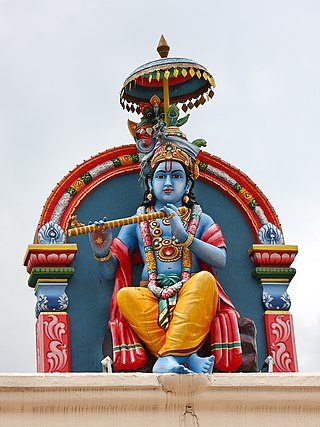
Krishna is a major deity in Hinduism. He is worshipped as the eighth avatar of Vishnu and also as the Supreme God in his own right. He is the god of protection, compassion, tenderness, and love; and is widely revered among Hindu divinities. Krishna's birthday is celebrated every year by Hindus on Krishna Janmashtami according to the lunisolar Hindu calendar, which falls in late August or early September of the Gregorian calendar.
The Birla family is an Indian business family connected with the industrial and social history of India.

Mathura is a city and the administrative headquarters of Mathura district in the Indian state of Uttar Pradesh. It is located 57.6 kilometres (35.8 mi) north of Agra, and 146 kilometres (91 mi) south-east of Delhi; about 14.5 kilometres (9.0 mi) from the town of Vrindavan, and 22 kilometres (14 mi) from Govardhan. In ancient times, Mathura was an economic hub, located at the junction of important caravan routes. The 2011 Census of India estimated the population of Mathura at 441,894.
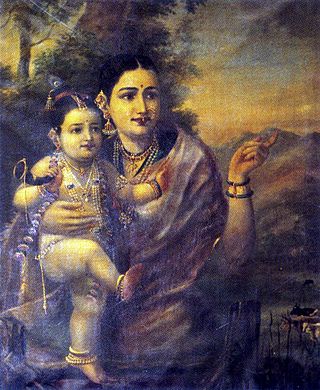
Krishna Janmashtami, also known simply as Krishnashtami, Janmashtami, or Gokulashtami, is an annual Hindu festival that celebrates the birth of Krishna, the eighth avatar of Vishnu. In certain Hindu texts, such as the Gita Govinda, Krishna has been identified as supreme God and the source of all avatars. Krishna's birth is celebrated and observed on the eighth day (Ashtami) of the dark fortnight in Shravana Masa. According to the purnimanta tradition), Krishna's birth is celebrated on the eighth day (Ashtami) of the dark fortnight in Bhadrapada Masa.

Vrindavan, also spelt Vrindaban and Brindaban, is a historical city in the Mathura district of Uttar Pradesh, India. It is located in the Braj Bhoomi region and holds religious importance for Hindus who believe that Krishna, one of the main Gods in Hinduism, spent most of his childhood in this city. Vrindavan has about 5,500 temples dedicated to the worship of Krishna and his chief consort, Radha. It is one of the most sacred places for Vaishnava traditions.
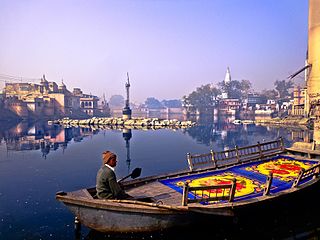
Mathura district is situated along the banks of the river Yamuna is a district of Uttar Pradesh state of north-central India. The historic city of Mathura is the district headquarters. Mathura district is home to many important sites associated with goddess Radha and Lord Krishna, who was born in Mathura and grew up in the nearby town of Vrindavan. Both cities are some of the most sacred sites in the Vaishnava tradition, making Mathura district an important Hindu pilgrimage centre.
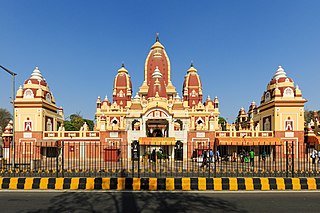
The Laxminarayan Mandir is a Hindu temple located in New Delhi, India. The presiding deity in the temple is Laxminarayan i.e., Vishnu along with his consort Lakshmi. The temple was inaugurated by Mahatma Gandhi. Gandhi ensured that members of all castes would be allowed in the temple. It was built by Jugal Kishore Birla from 1933 and 1939. There are also small shrines on the sides dedicated to Shiva, Ganesha, Hanuman and Buddha.

Shrinathji is a form of Krishna, manifested as a seven-year-old child. The principal shrine of Shrinathji is the Shrinathji Temple in the temple city of Nathdwara, 48 kilometres north-east of Udaipur city in Rajasthan, India. Shrinathji is the central presiding deity of the Vaishnava sect known as Pushtimarg or the Vallabha Sampradaya, established by Vallabhacharya. Shrinathji is worshipped mainly by the followers of Bhakti Yoga and the Vaishnavas in Gujarat and Rajasthan, and Bhatias amongst others.

The Birla Mandirs refer to different Hindu temples or Mandirs built by the Birla family in different cities across India. All these temples are magnificently built, some in white marble or sandstone. The temples are generally located in a prominent location, carefully designed to accommodate a large number of visitors. The worship and discourses are well organized. The first one was built in 1939 in Delhi collectively by Jugal Kishore Birla and his brothers and their father. Later temples were built by and managed by different branches of the family. For both of the temples in Varanasi, the Birlas joined other donors to support the cost.

Radha-Krishna is the combined form of the Hindu god Krishna with his chief consort and shakti Radha. They are regarded as the feminine as well as the masculine realities of God, in several Krishnaite traditions of Vaishnavism.
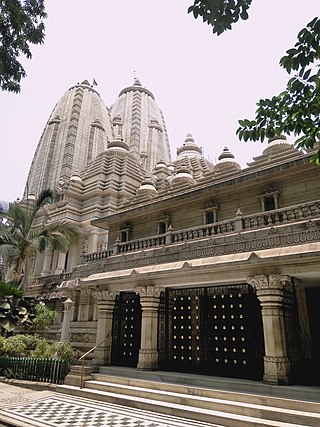
Birla Mandir in Kolkata, India, is a Hindu temple on Asutosh Chowdhury Avenue, Ballygunge, built by the industrialist Birla family. It is dedicated to Vishnu avatars such as Rama and Krishna. This temple is open in the morning from 5.30 A.M. to 11 A.M. and in the evening from 4 .30 P.M. to 9 P.M. On Janmashtami, the birthday of Krishna, devotees come from far away places to pay their respect to the deities.

Shri Shikshayatan School is a prestigious all girls school in Kolkata, West Bengal, India. It is affiliated to Central Board of Secondary Education. Shri Shikshayatan school offers education from pre-nursery up to class 12. The school has won the British Council International School Award numerous times and was declared as The Telegraph's School of The Year in 2018. The school branches out into The Shri Shikshayatan College, a NAAC A grade college affiliated to the University of Calcutta. The school was declared "India's Most Dynamic School" by the jury of Education Today in 2022.
Krishn Kanhai is an Indian artist and painter, specialist in portrait, realistic, contemporary paintings and on lord Radha-Krishna theme paintings. A Padmshri awardee, Kanhai is described as an artist with the midas touch.
Jagadguru Kripalu Parishat(JKP), previously known as Sadhna Bhawan Trust, is a charitable religious organisation in India. It was established in 1970 by Jagadguru Shri Kripalu Ji Maharaj and continues to run today under the three Presidents he appointed. The philanthropic activities are designed to fulfil the vision of Jagadguru Kripalu, who was entitled with Jagadguru on 14 January 1957. To fulfil his vision, Jagadguru Shri Kripalu Ji established three major temples, Bhakti Mandir (Bhakti Dham, Mangarh), Prem Mandir (Vrindavan) and Kirti Mandir (Barsana).
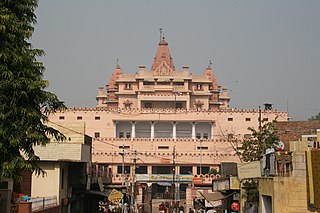
Krishna Janmasthan Temple Complex is a group of Hindu temples situated in Mathura, Uttar Pradesh, India. There are three main temples inside the premises -- Keshavdevtemple which is dedicated to Krishna, Garbh Griha where Krishna is believed to be born in Dvapar Yuga and Bhagvata Bhavan where presiding deities are Radha Krishna.

Shri Radha Vallabh Temple, also called Shri Radha Vallabhlal ji Temple is a historic temple in the city of Vrindavan, Mathura district, Uttar Pradesh, India. The temple is dedicated to Hindu deities Radha Krishna. The temple belongs to Radha Vallabh Sampradaya and was constructed in 16th century under the guidance of Vrindavan saint Hith Harivansha Mahaprabhu.
References
- 1 2 3 Margaret Herdeck; Gita Piramal (1985). India's Industrialists. Lynne Rienner Publishers. p. 62. ISBN 978-0-89410-415-2.
- 1 2 "G d birla". SlideShare. Archived from the original on 2 November 2011. Retrieved 14 August 2015.
- ↑ "Srila Prabhupada's Original pre-1978 Books Online". Prabhupada Books. Retrieved 19 September 2014.[ permanent dead link ]
- ↑ Kudaisya, Medha M. (2003). The Life and Times of G.D. Birla. Oxford University Press. pp. xvi, 194, 414. ISBN 978-0-19-564572-9 . Retrieved 11 September 2022– via Google Bookss.
- ↑ "Second Meeting of the Parishad". Vishva Hindu Parishad. Archived from the original on 11 October 2014. Retrieved 19 September 2014.
- Joya Chatterji (2002). Bengal Divided: Hindu Communalism and Partition, 1932–1947. Cambridge University Press. p. 236. ISBN 978-0-521-52328-8 – via Google Books.
- M. G. Chitkara (2004). Rashtriya Swayamsevak Sangh: National Upsurge. APH Publishing. p. 257. ISBN 978-81-7648-465-7 – via Google Books.
- Dhananjay Keer (1995). Dr. Ambedkar: Life and Mission. Popular Prakashan. p. 277. ISBN 978-81-7154-237-6 – via Google Books. - ↑ Joseph S. Alter (1992). The Wrestler's Body: Identity and Ideology in North India. University of California Press. p. 88. ISBN 978-0-520-91217-5 – via Google Books.
- 1 2 Anand Mohun Sinha (2011). Unspoken History of India of Six-Thousand Years. AuthorHouse. p. 208. ISBN 978-1-4520-9769-5 – via Google Books.
- ↑ K. Satchidananda Murty; Ashok Vohra (1990). Radhakrishnan: His Life and Ideas. SUNY Press. p. 100. ISBN 978-0-7914-0344-0.
- 1 2 "About School". Shri Shikshayatan School. Archived from the original on 30 September 2014. Retrieved 19 September 2014.
- ↑ Debi P. Mishra (1998). People's Revolt in Orissa: A Study of Talcher. Atlantic Publishers & Dist. p. 138. ISBN 978-81-7156-739-3 – via Google Books.
- 1 2 "Birla Temple Mathura also known as Gita Temple was founded by Jugal Kishore Birla in 1946". Archived from the original on 27 March 2015. Retrieved 19 September 2014.
- 1 2 3 "The Story of the Vivekananda Rock Memorial" . Retrieved 19 September 2014.
- ↑ History of Sirsa Town. Atlantic Publishers & Distri. 1991. p. 138 – via Google Books.
- "Birla Temple at Kurukshetra established in 1952 by Jugal Kishore Birla". Archived from the original on 24 May 2018. Retrieved 19 September 2014.
- "North Delhi Hanuman Temple founded by Jugal Kishore Birla in 1965". Archived from the original on 20 August 2013. Retrieved 19 September 2014. - 1 2 S. B. Bhattacherje (2009). Encyclopaedia of Indian Events & Dates. Sterling Publishers Pvt. Ltd. p. A178. ISBN 978-81-207-4074-7 – via Google Books.
- 1 2 "Shri Krishna Janmasthan". Shri Krishna Janmasthan Trust. Archived from the original on 4 September 2015. Retrieved 24 August 2012.
- "Tourism: A journey to Mathura- the Braj Mandal of Radha and Krishna". IndiaStudyChannel.com. 30 July 2012. Retrieved 19 September 2014. - ↑ Naresh Minocha. "Splitsville: the business of family feuds". Tehelka. Archived from the original on 22 November 2015. Retrieved 3 December 2023.
- ↑ "Ashrams & Temples". Archived from the original on 6 August 2013. Retrieved 19 September 2014.
- ↑ "Religious offerings". HDFC Bank. Archived from the original on 3 July 2014. Retrieved 19 September 2014.
- ↑ "Contact". Benaras Hindu University. Archived from the original on 5 February 2011. Retrieved 14 August 2015.
- ↑ "In a time warp". The Hindu . 7 December 2003. Archived from the original on 7 May 2004. Retrieved 19 September 2014.
- ↑ "Thep Montien – Inside Dev Mandir". Archived from the original on 25 March 2014. Retrieved 19 September 2014.
- ↑ "Nipponzan Myohoji temple, Mumbai, Bombay, Maharashtra, India, Video". IndiaVideo. Retrieved 19 September 2014.
- ↑ "Lord Krishna Temple, Mathura – History". Archived from the original on 21 August 2014. Retrieved 19 September 2014.
- ↑ Asha Sharma (2008). An American in Gandhi's India: The Biography of Satyanand Stokes. Indiana University Press. p. 287. ISBN 978-0-253-21990-9 – via Google Books.